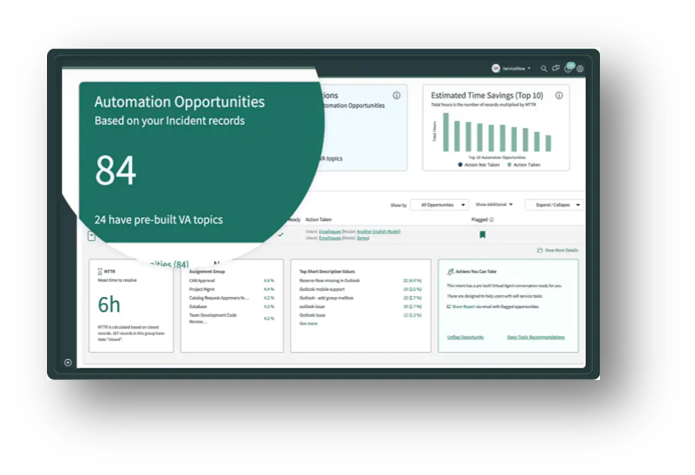In today’s fast-paced digital environment, companies are continuously looking for ways to increase operational efficiency, improve customer satisfaction and reduce costs. One of the most promising technologies for achieving these goals is artificial intelligence (AI). ServiceNow, one of the leading enterprise cloud platforms, has integrated AI-driven solutions to transform IT service management (ITSM). Among the most impactful of these innovations are ServiceNow AI agents.
These AI-powered virtual agents have the potential to revolutionise the way businesses manage IT services, from automating routine tasks to improving decision-making processes. Let’s take a look at what ServiceNow AI agents are, how they work and what benefits they offer.
What are ServiceNow ai-agents?
ServiceNow AI agents are intelligent virtual assistants that use machine learning and natural language processing (NLP) to automate IT workflows and provide support to employees and customers. These agents are designed to handle a wide range of tasks, from answering IT support queries to resolving common service desk issues, without human intervention.
ServiceNow’s AI agents use advanced features such as virtual chatbots, predictive analytics and automation to manage tasks traditionally performed by IT staff. The system continuously learns from user interactions, becoming smarter and more efficient over time.

Key features of ServiceNow AI agents:
1. Natural Language Processing (NLP): The AI agents use NLP to understand and respond to human language, making it easier for users to communicate and receive support. Conversations can be dynamically recognised and translated, allowing end users to interact with the virtual agent in the language of their choice.

3. Predictive analytics: Agents can analyse historical data and trends to predict problems before they occur, enabling businesses to take proactive measures to reduce downtime.

2. Automation of routine tasks: Routine IT tasks such as resetting passwords, installing software and forwarding tickets can be automated, allowing IT staff to focus on more complex issues.

4. integration into the ServiceNow platform: AI agents are fully integrated into the ServiceNow platform, enabling seamless interactions with other ITSM workflows, processes and systems.
How do ServiceNow AI agents work?
At the heart of ServiceNow AI agents is machine learning. The AI uses algorithms to analyse historical data, user behaviour and patterns in service requests. Here is a step-by-step overview of how the AI agents work:
- User request: An employee or customer sends a request via a chat interface or by voice command. This request can be a question, a problem or a task.
- Intent recognition: The AI agent uses NLP to understand the intent behind the request. For example, in the case of a password reset request, the AI recognises that the task is related to account management.
- Automation or escalation: If the task is simple, such as providing instructions for resetting a password, the AI agent can automatically resolve the issue. For more complex issues, the agent can escalate the request to the IT support team or suggest a solution.
- Learning and improvement: The more the AI interacts with users, the better it understands requests and provides more accurate solutions. The system continuously learns from past interactions and improves its responses over time.
Use cases for ServiceNow AI agents
- Service desk automation: Instead of waiting for a service desk agent, employees can interact with an AI-powered agent that handles common requests such as password resets, software installations and service requests.
- Incident management: AI agents can help identify and resolve IT incidents before they affect users. By analysing system data and past incidents, AI can predict potential failures and alert the IT team early.
- Onboarding: ServiceNow AI agents can automate the onboarding process for new employees. The agent can answer questions, assign tasks and ensure that the new employee has all the resources they need to get started.
- Knowledge management: AI can answer frequently asked questions or provide solutions to common IT issues by accessing a knowledge base. This reduces the number of tickets created and saves both users and IT support teams time.
Benefits of ServiceNow AI agents
- Increased efficiency: By automating repetitive tasks and providing instant answers to common questions, AI agents can significantly reduce the workload on IT teams.
- 24/7 availability: AI agents are always available, so users can get support anytime, anywhere.
Cost savings: Because AI takes on routine tasks, the need for large IT support teams can be reduced, resulting in cost savings while maintaining the same high quality of service. - Better user experience: The personalised and efficient support provided by AI agents improves overall user satisfaction.
- Continuous improvement: AI agents learn from every interaction and continuously improve.
Challenges to be considered
While there are significant benefits to be gained from using AI agents with ServiceNow, there are some important points to consider:
- Initial setup: Setting up AI agents may require an initial investment of time and resources. It is essential to integrate AI into existing workflows and systems.
- User acceptance: Some employees or customers may be hesitant to confide in an AI-driven agent. They would rather have a human being to help them, especially in complex situations. This challenge can be overcome with targeted training and communication.
- Data protection: The handling of sensitive data by AI agents requires strict security protocols to ensure compliance with data protection regulations and to prevent data protection violations.
Conclusion
ServiceNow AI agents are changing the way organisations can manage their IT services. By using AI, automation and predictive analysis, companies can optimise their operations, reduce costs and provide a great user experience. As AI technology continues to advance, the potential for ServiceNow AI agents to transform IT service management will continue to grow. Organisations seeking a competitive advantage in the digital era should consider implementing AI-driven ITSM.
